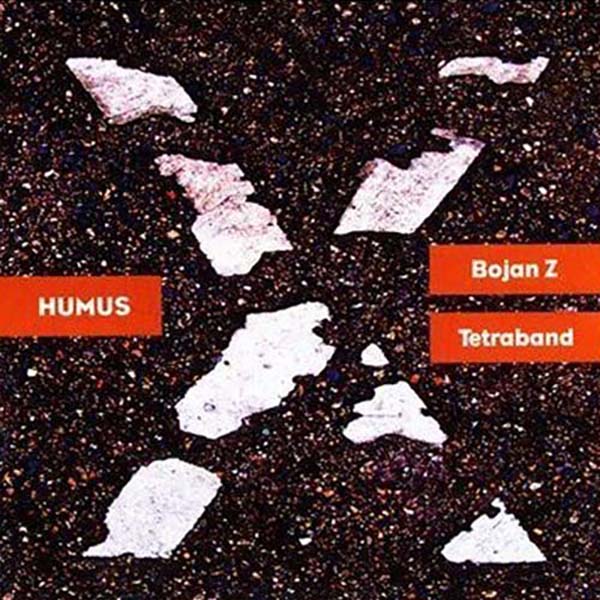
by Ian Mann
January 14, 2010
/ ALBUM
An idiosyncratic and iconoclastic blend of rock energy and jazz intelligence
Born in Belgrade pianist Bojan Zulfikarpasic (hitherto Bojan Z or just plain Z) has been based in Paris for the past 20 years. Classically trained he has released half a dozen albums, all of them significantly different, and has collaborated with many of Europe’s leading jazz musicians among them trumpeter Paolo Fresu, bassist Henri Texier and saxophonist Julien Loreau.
Something of a musical maverick Z has always been interested in making music that blurs traditional musical boundaries. Tetraband came about when he heard the similarly inclined British drummer Sebastian Rochford at the 2004 Bath Jazz Festival. Rochford subsequently added Tetraband to his ever increasing list of credits joining up with Z, American trombonist Josh Roseman and bassist Christophe Mincke.
For the recording of “Humus” Mincke has been replaced on electric bass by Ruth Goller, Rochford’s rhythm section partner in Acoustic Ladyland. The title, says Z, comes from his devotion to “cultivating the fertile soil of music.” He goes on to say that “Humus” is “the most ‘rock’ album I could record.”
In this spirit Z is heard on both acoustic and electric pianos plus his invention the “Xenophone”, an instrument assembled from discarded electric piano parts. Of the nine tracks to be heard here seven are Z originals with Rochford and Roseman contributing a song each.
“Natural Ground” begins deceptively quietly as Z’s keyboards hover and shimmer. Electronics play an important part in this music, both in Z’s keyboard layering and also the effects applied to Roseman’s trombone. The momentum builds through a sparkling acoustic piano solo, followed by Roseman’s gutsy, now untreated trombone. Rochford builds up his customarily brilliant polyrhythmic storm only letting up during a ghostly, impressionistic end section.
“Greedy (in goods we trust)”-great title- begins in full on skronk mode but despite the fact that much of this music makes use of rock rhythms and dynamics it is also constantly changing in the manner of the best jazz. Even here there are thoughtful interludes for trombone and electric piano, but it has to be said that the tune’s main riff is an absolute killer.(did I detect a hint of Van Der Graaf Generator in there somewhere?).
“No.9” ‘s odd meter groove is the springboard for Z’s expansive, sometimes surprisingly lyrical acoustic piano explorations. As Rochford’s drumming becomes more martial Roseman takes off with some low down and dirty trombone. The spirit of contrast runs deep within Z’s music, moods and styles change in the blink of an eye, often in the course of a single tune. Here the composer even throws folk elements from his Balkan background in to the mix.
Rochford’s tune “Empty Shell” originally appeared on the only album (to date) by his band Fulborn Teversham. There it featured the punk like vocals of singer Alice Grant, here in a greatly expanded version Roseman’s trombone initially takes on the melody as Z’s piano alternately thunders and whispers. The punk/gothic spirit of the original remains and Roseman is outstanding in the lengthy , abstract central section. The piece ends with an excoriating blast of all out skronk.
The brief solo piano musings of “Focus@” come as something of a relief after such intensity and leads into the lively,strongly folk influenced “Fuzzlija”. Nevertheless this is music with a modern bite and edge. Z’s piano sometimes sounds heavily treated during the course of a frenetic solo and Rochford’s skittering drumming is relentless in it’s energy.
“August Tune” swings amiably along, in rather too sprightly a fashion to be classed as the album’s ballad. An appropriately sunny and good natured vibe purveys the piece but even here the quartet dive off into more abstract passages. This is a unit that for all the rock urgency on display is constantly thinking on it’s feet.
Propelled by Goller’s insistent bass groove Roseman’s aptly titled “Swamp Tune” is a feature for his trombone, the sound sometimes mutated via wah wah pedals etc. Z’s keyboards act as a perfect foil on this piece of cerebral funk, an equal mix of gutbucket energy and sharp eyed intelligence.
The closing “Thirst Day” exhibits similar qualities with pounding but intelligent rhythms providing the backdrop for a kind of “Bitches Brew” style freak out. Z’s layered keyboards dominate, there’s a stunning electric piano solo, but Goller and Roseman also enjoy moments in the spotlight as Rochford hammers relentlessly away.
Despite all the rock trappings this is fiercely intelligent, constantly evolving music that reveals more on each new listening. The blending of acoustic and electric elements is done with aplomb and Z’s writing is multi faceted and consistently interesting. On this evidence the band’s UK album launch date at Ronnie Scott’s on 18th January 2010 should be well worth seeing.
blog comments powered by Disqus